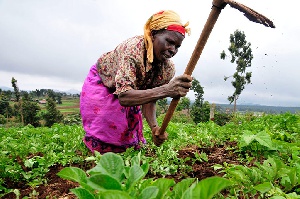Organisations that are sympathetic to the cause of small-scale farmers have said the country’s investment in agriculture has to be tailored to benefit farmers more directly, as against spending on recurrent expenditure.
“We don’t have a problem with what goes into recurrent expenditure, but we want to see an increase in how much goes directly to benefit the farmers -- increased productivity, increased access to markets, storage, and all the things that will go to improve the lives of small-scale farmers,” Victoria Adongo, Programmes Coordinator of the Peasant Farmers Association, told journalists at a meeting on agricultural investment in Accra.
Smallholder farmers, said to produce about 80 percent of Ghana’s total agricultural output, are considered as constituting the poorest segment of the population -- a situation advocacy groups see as anomalous.
In early 2010, SEND Foundation -- one of the organisations advocating a fairer food distribution system -- published a report which indicated that even though Ghana was close to achieving the 10 percent investment of national budget in agriculture target under the 2013 Maputo Declaration, much of the investment went into recurrent expenditure comprising salaries and administrative expenses.
While Government has said that investment in agriculture and agricultural productivity has gone up, critics say the reverse is the case. Reacting to the 2013 budget, the Member of Parliament for Kwadaso and ranking member on Parliament’s Food and Agriculture Committee, Dr. Owusu Afriyie Akoto, said the GH¢340million allocated to the agricultural sector represented only 2 percent of the national budget, which is inadequate.
Advocacy organisations observe that if Government wants to achieve its poverty-reduction strategy goals, focusing on improving the livelihoods of smallholders will be key. Under a global campaign known as “GROW”, Oxfam, in collaboration with other advocacy organisations, is seeking to push Governments in some 21 countries, including Ghana, to increase investment in small-scale agriculture in a bid to improve the livelihoods of smallholders.
The campaign, running from 2012 to 2015, has among its objectives improving small farmers’ access to land, farm inputs, markets and a guaranteed minimum price. Land-grabbing by large multinationals across the developing world is particularly seen as posing a threat to the livelihoods of smallholders.
“The injustice in the system allows some people to be able to amass so much to the disadvantage of so many other people, and that can be seen in the use of the resources in agricultural production. For example, in terms of access to land, some people -- like women and migrants -- do not have access to good and fertile land used in the production of food crops, and it is unfair to them,” said Dominic Deme-Der, Research and Policy Manager at Oxfam’s office in Ghana.
In 2012 the advocacy organisations launched “The Farmers Manifesto”, calling for far-reaching responses to the challenges of agriculture in the country -- particularly concerning the livelihoods of smallholders.
The manifesto, among other things, asked Government to ensure that at least 40 percent of the annual budgetary allocation to the agriculture sector “directly benefits small-scale farmers”. According to Victoria Adongo some of the issues in the manifesto have been taken care of in the 2013 budget, but others remain a challenge.
“Access to credit, for example, is a major problem for small-scale farmers. So I think Government should consciously try to address this: Government does not seem to be addressing it properly. They have established the Export Development and Agric Investment Fund, which for us does not benefit small-scale farmers. It is a no-go area for small-scale farmers,” she said.
“I haven’t seen any small-scale farmer that has benefitted from it because of the criteria -- the very same reasons that make access to credit for small-scale farmers difficult still exist there, and they have linked it to exports. Apart from those in horticulture, small-scale farmers do not export,” she added.
Business News of Saturday, 6 April 2013
Source: B&FT

















